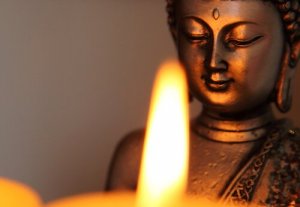Seven Buddhist Keys to Deal with Anger

Buddhists believe that people require special training in order to learn to deal with anger. There are certain attitudes and virtues we need to develop to achieve it.
Feeling angry is completely normal. However, if you don’t know how to deal with it, you could hurt others or yourself. Don’t forget that getting angry for a few minutes can change a whole lifetime.
“The mind is everything. What you think, you become.”
-Buddha-
In Buddhism, meditation is a way to gain greater self-control and consciousness. Likewise, there are some keys that, along with meditation, contribute to learning how to deal with anger. Here are seven of them:
1. Acceptance can help you deal with anger
Buddhism states that the best way to start dealing with anger is to accept that you’re angry. It seems like a cliché, but many people try to hide their anger because it seems disgraceful to them to feel it.
No emotion is either good or bad. What matters is how you deal with what happens to you and what you feel. Human beings experience all kinds of emotions, which is why it’s important to recognize and accept all of them.

2. Be a hero
If all you do is explode and unleash your impulses when you’re angry, then you don’t know how to deal with this emotion. Only heroes know how to deal with their anger. They know that unleashing their anger uncontrollably leads to new evils.
Heroism is about not reacting and practicing patience instead. Likewise, it’s about not getting carried away. In other words, it’s about waiting and not becoming a prisoner of your impulses. You have to give yourself some time to respond to any situation intelligently.
3. Realism
Anger is an emotion that puts you at risk and threatens your physical and mental health. It’s your enemy. However, some people tend to believe the illusion that unleashing your anger uncontrollably is a way of reaffirming themselves.
You can’t let yourself get carried away by this fantasy. Likewise, that same anger may even lead you to overestimate the situation. That’s why it’s important to stay grounded on realism. Is the situation or person really harming you? Will exploding in anger really lead to a solution?
4. Observation
Self-observation is a very helpful way to deal with anger. Before reacting, it’s good to stop for a moment and observe what’s happening in your body. What muscles are tense? How does your stomach feel? How are you breathing?
Likewise, it’s important to analyze the ideas that go through your mind. Instead of thinking about the other person or the situation that’s generating discomfort, focus your attention on yourself. This observation exercise can help calm you down.

5. Learn from the enemy
Buddhism states that you should look after, care for, and protect your enemy. This may seem contradictory at first. However, it’s a really intelligent way to deal with anger. You have to ask yourself what you can learn from that person or situation that’s making you angry.
It’s important to be willing to compromise. Remember that neither you nor your enemy possess the absolute truth. Also, you have to remember that not everyone will agree with you. Try to understand the reason behind whatever opposes you. Surely, there’s something to learn.
6. Think about death
Many people have had near-death experiences that have changed their perspective. This is because those situations crudely remind you that everything ends, including your life. For this reason, it’s not good to waste your life on nonsense.
Thus, it’s a good idea to ask yourself how important that person or situation would be if today was the last day of your life. Would it be worthwhile to dedicate your remaining hours to that situation, feeling, or person?
7. Sow
According to Buddhists and common sense, you usually reap what you sow. Therefore, you’re responsible for your own suffering. If you sow destruction, you’ll also reap it. Likewise, if you start a cycle of violence, you’ll become its own victim sooner or later.
Therefore, you must be careful with how you act. Think about your well-being and think about the consequences. This will be impossible for you to do if you’re angry. Thus, the appropriate thing is to give yourself some time to reflect.
All these Buddhism keys to deal with anger seek to remind us that acting impulsively almost always brings negative consequences. Your mind should direct your actions, not the other way around.
Buddhists believe that people require special training in order to learn to deal with anger. There are certain attitudes and virtues we need to develop to achieve it.
Feeling angry is completely normal. However, if you don’t know how to deal with it, you could hurt others or yourself. Don’t forget that getting angry for a few minutes can change a whole lifetime.
“The mind is everything. What you think, you become.”
-Buddha-
In Buddhism, meditation is a way to gain greater self-control and consciousness. Likewise, there are some keys that, along with meditation, contribute to learning how to deal with anger. Here are seven of them:
1. Acceptance can help you deal with anger
Buddhism states that the best way to start dealing with anger is to accept that you’re angry. It seems like a cliché, but many people try to hide their anger because it seems disgraceful to them to feel it.
No emotion is either good or bad. What matters is how you deal with what happens to you and what you feel. Human beings experience all kinds of emotions, which is why it’s important to recognize and accept all of them.

2. Be a hero
If all you do is explode and unleash your impulses when you’re angry, then you don’t know how to deal with this emotion. Only heroes know how to deal with their anger. They know that unleashing their anger uncontrollably leads to new evils.
Heroism is about not reacting and practicing patience instead. Likewise, it’s about not getting carried away. In other words, it’s about waiting and not becoming a prisoner of your impulses. You have to give yourself some time to respond to any situation intelligently.
3. Realism
Anger is an emotion that puts you at risk and threatens your physical and mental health. It’s your enemy. However, some people tend to believe the illusion that unleashing your anger uncontrollably is a way of reaffirming themselves.
You can’t let yourself get carried away by this fantasy. Likewise, that same anger may even lead you to overestimate the situation. That’s why it’s important to stay grounded on realism. Is the situation or person really harming you? Will exploding in anger really lead to a solution?
4. Observation
Self-observation is a very helpful way to deal with anger. Before reacting, it’s good to stop for a moment and observe what’s happening in your body. What muscles are tense? How does your stomach feel? How are you breathing?
Likewise, it’s important to analyze the ideas that go through your mind. Instead of thinking about the other person or the situation that’s generating discomfort, focus your attention on yourself. This observation exercise can help calm you down.

5. Learn from the enemy
Buddhism states that you should look after, care for, and protect your enemy. This may seem contradictory at first. However, it’s a really intelligent way to deal with anger. You have to ask yourself what you can learn from that person or situation that’s making you angry.
It’s important to be willing to compromise. Remember that neither you nor your enemy possess the absolute truth. Also, you have to remember that not everyone will agree with you. Try to understand the reason behind whatever opposes you. Surely, there’s something to learn.
6. Think about death
Many people have had near-death experiences that have changed their perspective. This is because those situations crudely remind you that everything ends, including your life. For this reason, it’s not good to waste your life on nonsense.
Thus, it’s a good idea to ask yourself how important that person or situation would be if today was the last day of your life. Would it be worthwhile to dedicate your remaining hours to that situation, feeling, or person?
7. Sow
According to Buddhists and common sense, you usually reap what you sow. Therefore, you’re responsible for your own suffering. If you sow destruction, you’ll also reap it. Likewise, if you start a cycle of violence, you’ll become its own victim sooner or later.
Therefore, you must be careful with how you act. Think about your well-being and think about the consequences. This will be impossible for you to do if you’re angry. Thus, the appropriate thing is to give yourself some time to reflect.
All these Buddhism keys to deal with anger seek to remind us that acting impulsively almost always brings negative consequences. Your mind should direct your actions, not the other way around.
All cited sources were thoroughly reviewed by our team to ensure their quality, reliability, currency, and validity. The bibliography of this article was considered reliable and of academic or scientific accuracy.
Hanh, T. N. (2002). La ira: el dominio del fuego interior. Oniro.
This text is provided for informational purposes only and does not replace consultation with a professional. If in doubt, consult your specialist.







